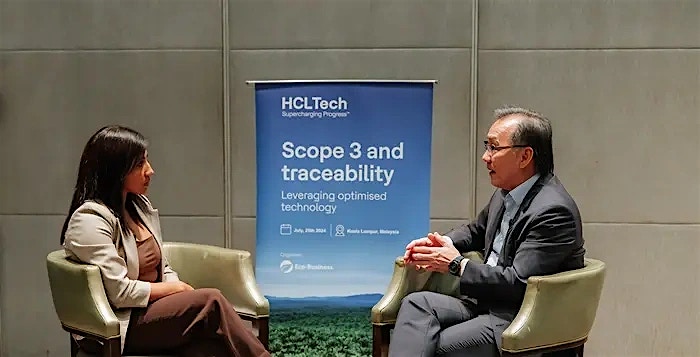The palm oil industry stands at a critical juncture, with sustainability and regulatory compliance becoming increasingly vital. As the European Union Deforestation Regulation (EUDR) comes into effect on December 30, 2024, palm oil enterprises that export to EU must ensure their products are deforestation-free and traceable to their point of origin. This regulatory shift is poised to significantly impact the industry and technology will play a crucial role in piloting these changes.
At a recent Palm Oil Conference in Kuala Lumpur, hosted by HCLTech, industry leaders gathered to discuss these pressing challenges. Tan Boon Hien, APAC Head of Sustainability at HCLTech, shared his insights on the future of the palm oil industry and the pivotal role of technology to help resolve the challenges of driving sustainability.
The EUDR and its implications
The EUDR represents a monumental step toward sustainability in the palm oil industry, requiring exporters of palm oil to EU to provide documentary evidence of the origin of harvest of their products. Tan highlighted the significance of this regulation: "The pressure point is significant. The EUDR requires exporters to show documentary evidence from the original harvest to the finished product before the exporting enterprises can access the European market, which offers more attractive margins compared to India and China."
This regulation, along with stringent ESG compliance reporting deadlines from their MNC clients and respective nations' local stock exchanges, places immense pressure on the palm oil industry to quickly adapt. The implications of these regulations extend beyond compliance; they signify a broader shift toward greater transparency and accountability in the industry.
Enterprises that fail to meet these standards potentially risk either losing access to the more lucrative EU markets or pay higher export tariff and/or eroding the enterprise brand. It's imperative that the industry must embrace innovative solutions to help solve these challenges and optimize return on investment.
The role of technology in meeting regulatory demands
Given the complexity and the scale of the palm oil supply chain, it is essential to leverage technology to help in ESG reporting, tracing of fruits to finished products in the supply chain and the implementation of the decarbonization program. Data management is the foundation to support all the above. Tan emphasized HCLTech's strategic approach: "We have multi roles to play. We partner with ESG compliance reporting software providers in ESG reporting, data collection and integration. We also participate in helping to develop a Net Zero Plans and help execute the clients' decarbonization projects." This approach ensures that HCLTech is involved from the strategic to operational phases, helping clients optimize the investments.
One of the key solutions HCLTech offers is the Net Zero Intelligence Operation (NIO) solution. Tan explained, "This solution focuses on assessing, monitoring and reducing energy consumption and therefore, carbon emissions. This is particularly effective in palm oil factories or supply chains that have multiple assets, such as engines and boilers that consume energy to operate."
In addition to energy consumption tracking, HCLTech's solutions enable comprehensive traceability throughout the supply chain. This traceability is not only vital for compliance but also for fostering trust among consumers and stakeholders. By leveraging advanced technologies like blockchain and IoT, companies can create transparent, immutable records of their products' journeys from plantation to end-product.
Future trends in sustainability and technology
Looking ahead, Tan sees several trends shaping the future of sustainability in the palm oil industry. "Different industries will have different trends, in Asia, most of the enterprises have yet to fully implement Scope 3 and decarbonization programs, which require significant IT support. The ability to digitally connect and manage all parts of the supply chain leads to faster and better-quality management decisions, which will help differentiate from the competition."
"For the palm oil industry, this involves smart farming, smart logistics, like the ‘uberisation’ of transport and smart factories," he noted. These innovations along the supply chain will help the industry optimize their operations and reduce its environmental carbon footprints. This can only be achieved via a well-structured data management platform.
The new emergent trend is the integration of artificial intelligence (AI) and machine learning (ML) in predictive analytics. These technologies can forecast demand, optimize resource allocation and enhance decision-making processes. By predicting potential issues and addressing them proactively, companies can maintain high levels of efficiency and sustainability.
HCLTech's strategic solutions
HCLTech is poised to support the palm oil industry through its comprehensive suite of solutions. Tan emphasized, "Our smart Net Zero Intelligent Operations (NIO) solution is ideal to help clients that have business in factory and manufacturing. It provides a detailed breakdown of energy consumption by asset, enabling quantification of carbon footprint and helps reduce the energy consumption and carbon footprints." This solution is just one of many examples of how HCLTech is helping the industry navigate complex regulatory landscapes.
HCLTech also offers sustainability services in data management, system integration and program management. Tan explained, "Our unique approach combines industry domain understanding, the integration of green and 'brown’ IT and non-IT projects and data management to address environment, social and governance areas. This comprehensive program optimizes client's investment."
The importance of collaboration and innovation
Collaboration is key to driving sustainability in the palm oil industry. Tan stated, "The industry needs a lot of help to solve its problems. HCLTech partners with the best in breed solution vendors from global and APAC to collectively participate in the projects, which brings a lot of benefits to our clients."
The Palm Oil Conference in Kuala Lumpur served as a platform for industry leaders to share insights and explore innovative solutions. Tan expressed his enthusiasm for the industry's future: "I'm very excited about this industry and looking forward to doing a lot of business in it. The potential for innovation and growth is immense."
Next steps
The palm oil industry is undergoing a significant transformation driven by regulatory changes and the need for greater sustainability. Technology, particularly in the areas of traceability, energy and carbon management, data management and predictive analytics, will be crucial in meeting these challenges. HCLTech's comprehensive solutions and strategic approach provide the industry with the tools and support needed to pivot this complex ecosystem and achieve long-term success.






